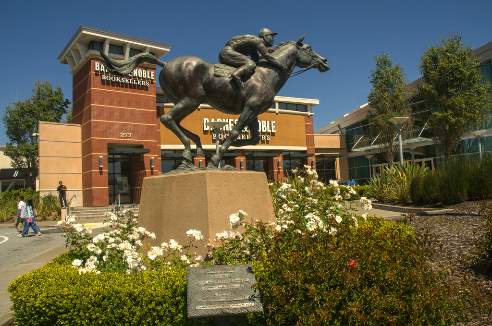Reading time: About 3 minutes
Today’s column looks at the important topic of telling stories — admittedly, through the eyes of a horse!
I have never ridden a horse. Nor have I had much interest in them. When I was in my early 20s, a journalist friend of mine was given $50 and assigned a story on horseracing. Never having been to such a race, she realized her editor wanted a “women don’t know how to bet on horses” tale (remember: this was the early 1980s.) So, she dragged me to the track for an extra dollop of the stupid chick factor. I hate to admit it, but we were as pathetic as the editor predicted. We were so scared to wager we put no more than $10 on a horse (together).
Now, flash forward to the end of 2009 and the annual race of media outlets producing their “end of the decade” stories. I usually only glance at such lists but this time my eyes were suddenly harnessed (ha ha) by a story on the best books of the last 10 years. And right near the top? Seabiscuit: An American Legend, by Laura Hillenbrand, 2007. Perhaps the devil made me do it, or maybe it was my contrarian nature but despite my disinterest in horses, I immediately borrowed the book from the library.
At 399 pages, the work is not exactly a quick read. Furthermore, the style seemed overwritten to me. (Which is not to say it was bad — just not to my taste.) Here, for example, is an early paragraph:
“Fifty-eight years old in 1935, Howard [Seabiscuit’s eventual owner] was a tall, glowing man in a big suit and a very big Buick. But it wasn’t his physical bearing that did it. He lived on a California ranch so huge that a man could take a wrong turn on it and be lost forever, but it wasn’t his circumstances either. Nor was it that he spoke loud or long; the surprise of the man was his understatement, the quiet and kindly intimacy of his acquaintance. What drew people to him was something intangible, an air about him. There was a certain inevitability to Charles Howard, an urgency radiating from him that made people believe that the world was always going to bend to his wishes.”
What this section does right is that it pulls you along. Notice how the author sets up a series of negative propositions: (It’s not Howard’s physique that makes him imposing. Nor is it the size of his ranch. Nor is it his voice. Nor is it his manner.) By the time you’ve reached the fourth negation, you feel like a kid being driven crazy by the smell of chocolate chip cookies in the oven. You have to keep reading because you’re salivating to know exactly what made Howard successful.
What I didn’t like, however, was the author’s overstatement. Could someone really get lost on a California range forever? And what the heck is a “certain sense of inevitability”? Finally, surely to goodness, a man’s ill-defined personal characteristic (“inevitability”) is not enough to make people in the entire world believe they would “bend to his wishes.” (And the book itself also thoroughly disproves this.)
So, okay, I didn’t like the writing style. But, I loved the book. And so did my husband — who is just as disinterested in horses as I. Were we hypnotized? No! We were compelled by the story itself.
It’s gripping! Seabiscuit was an unattractive, knobby-kneed horse who seemed to enjoy eating and sleeping much more than racing. Despite a heavy schedule, he won only a handful of races and his original owner decided to sell him. The buyer? Charles Howard. He hired Tom Smith, an unusual and gifted trainer. Finally, the two teamed up with jockey Red Pollard — a semi-broken down man, but a fierce competitor.
Trust me, that wasn’t the end of the story. Readers are entertained by the races Seabiscuit wins unexpectedly and crushed by the races he loses. We’re appalled by the serious injuries Red Pollard endures, as he’s thrown from horses and captivated by his remarkable recoveries.
What author Laura Hillenbrand understands is the single most important thing about writing. You need to tell stories.
Perhaps, many of your readers, will be as disinterested in whatever subject you’re writing about as I was in horseracing. But if you can tell good stories, your readers will stick with you til the end.
My urgent advice? Find the stories hiding in whatever you need to write about.


